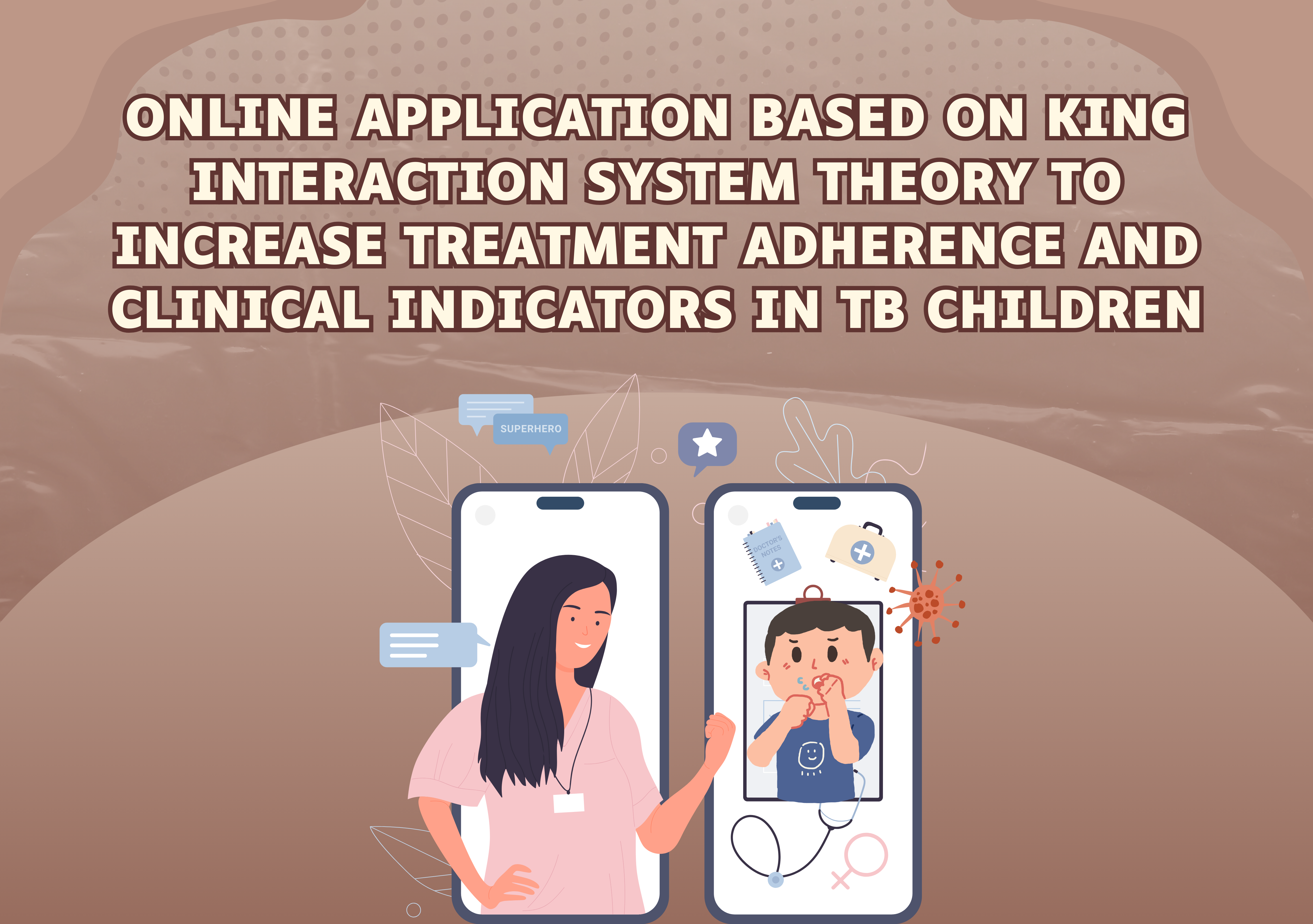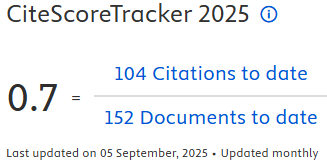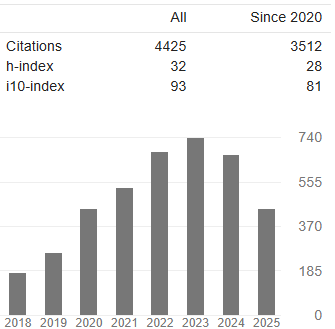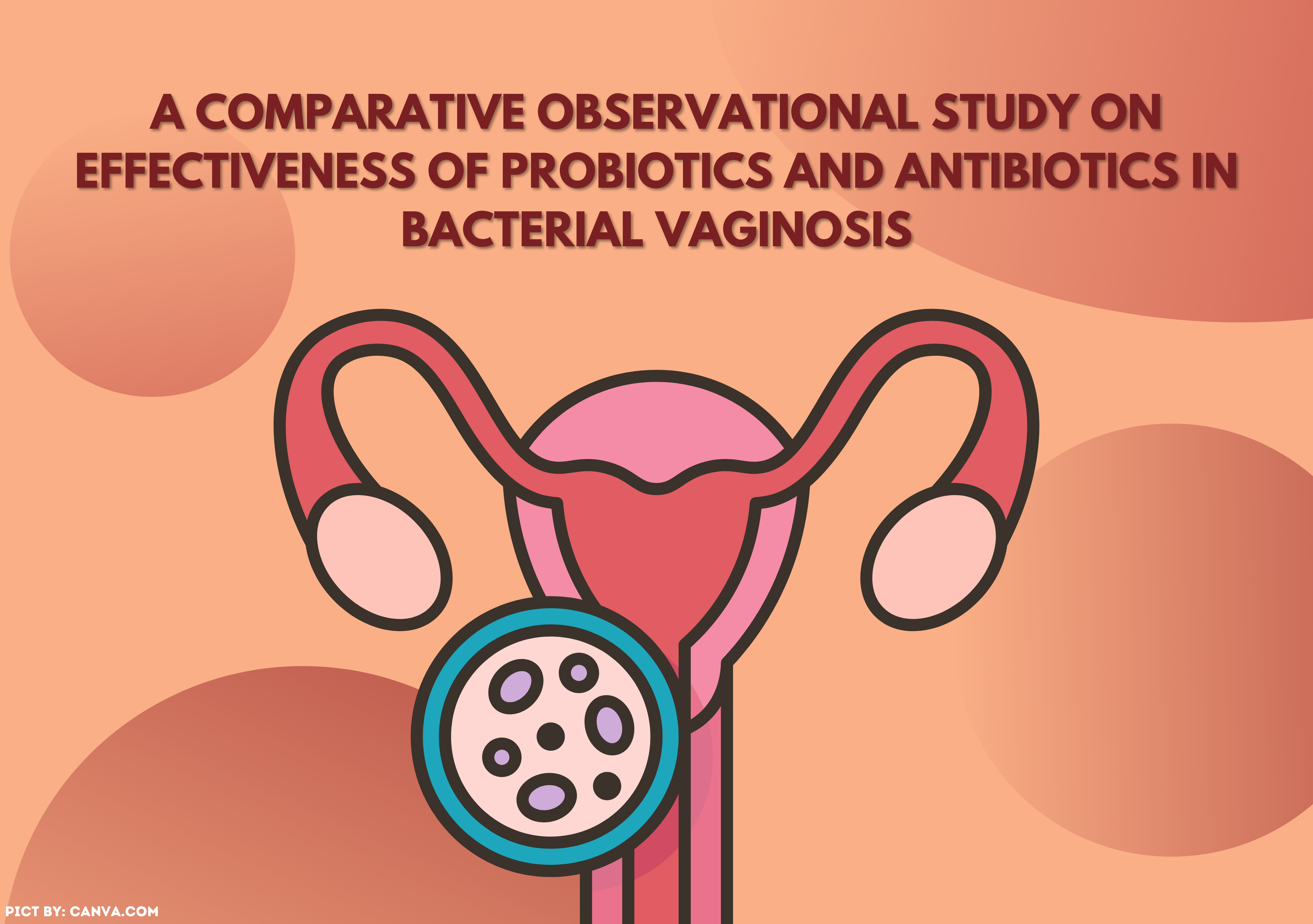ONLINE APPLICATION BASED ON KING INTERACTION SYSTEM THEORY TO INCREASE TREATMENT ADHERENCE AND CLINICAL INDICATORS IN TB CHILDREN

Introduction: Non-adherence to treatment among TB children in Indonesia varied 40.5%-57.2%. An innovative method of education might improve treatment adherence and clinical recovery of TB children. The aims of this study were to compare the treatment adherence and clinical indicators of TB children who received an intervention using an online application based on King's theory with a conventional method. Methods: This is a quasi-experimental study to educate 55 TB school-age children using a validated online application based on King's interaction system theory, compared with the conventional method in 55 TB children as the control group. The medication regularity and control discipline were observed four times in weeks 2, 4, 6, and 8. Measurements of acid-fast bacilli (AFB) smear sputum examination, TB scoring, chest X-ray examination, level of Hb, and nutritional status were done twice in pre- and post-intervention. Data analysis used chi-square, paired t-test, independent t-test, Mann Whitney, McNemarᵇ. or Wilcoxon test. Results: The results of this study revealed that the intervention group was significantly successful compared to the control group in several indicators, such as increasing treatment adherence (p=0.001), controlling discipline (p=0.001), reducing AFB positive (p=0.001), TB scoring (p=0.001), infiltrate in chest X-ray examination ((p=0.013), and increasing Hb levels (p=0.001). Meanwhile, nutritional status could not be compared because, from the beginning of the study, the nutritional status was unbalanced and benefited the intervention group. Conclusion: The online application based on King's theory has succeeded in increasing medication adherence and clinical improvement of pulmonary TB in children.
Abdusalomova, M., Denisiuk, O., Davtyan, H., Gadoev, J., Abdusamatova, B., Parpieva, N. and Abduvohid Sodikov., 2021. Adverse Drug Reactions among Children with Tuberculosis in Tashkent, Uzbekistan. International Journal of Environmental Research and Public Health, 18, 7574. https://doi.org/10.3390/ijerph18147574
Adib Hajbaghery, M. and Tahmouresi, M, 2018. Nurse–patient relationship based on the Imogene king’s theory of goal attainment. Nurse Midwifery Study, 7, pp.141-144. https://doi.org/10.4103/nms.nms_10_17
Alligood, M.R, 2010. Family healthcare with King’s theory of goal attainment. Nursing Science Quarterly, 23(2), pp.99–104. https://doi.org/10.1177/0894318410362553
Anggraeni, Y., Tresno, N.R.I.A., Susanti, I.H. and Mangkunegara, I.S., 2020. The Effectiveness of Health Education Using Leaflet and Video on Students’ Knowledge About the Dangers of Smoking in Vocational High School 2 Purwokerto. Proceedings of the 1st International Conference on Community Health, pp.369–375. https://doi.org/10.2991/ahsr.k.200204.076
Baharuddin, K, 2016. Factors Affecting the Recurrence of Tuberculosis in Health Makassar South Sulawesi. International Journal of Sciences: Basic and Applied Research, 30(3), pp.237-247.
Baharuddin, K, 2019. Factors influence failure of lung TB treatment in children in the community health centre in Makasar. Scientific Journal of Health and Diagnosis, 13(6), pp.680-685.
Balasi, L.R., Elahi, N., Beiranvand, S., Tavakoli, P. and Balasi, R.R., 2020. The Effectiveness of Nursing Interventions Based on King’s Theory: A Systematic Review. Advances in Nursing and Midwifery, 29(3), pp.41-43.
Diesty, U.A.F., Suryadi, R.M., and Zulkarnain, Tj.K., 2020. Medical Compliance Determinants for Tuberculosis Patients in Palembang. Jurnal Ilmu Kesehatan Masyarakat, 11(3), pp.272-284. doi: https://doi.org/10.26553/jikm.2020.11.3.272-284
Gao, Z., Liu, Q., Deng, Q., Kong, L. and Liu, Y., 2023. Growth and anemia among children with tuberculosis infection at different sites in Southwest China. (2023). Frontiers in Pediatrics, 11, 1188704. https://doi.org/10.3389/fped.2023.1188704
García-Basteiro, A.L, López-Varela, E, Augusto, O.J., Gondo, K., Muñoz, J., Sacarlal, J., Marais, B., Alonso, P.L and RibŌ, J.L., 2015. Radiological Findings in Young Children Investigated for Tuberculosis in Mozambique. PLoS ONE, 10(5), e0127323. https://doi.org/10.1371/journal.pone.0127323
Gebreweld, FH., Kifle, M.M., Gebremicheal, F.E., Simel, L.L., Gezae, M.M., Ghebreyesus, S.S., Mengsteab, Y. T. and Wahd, N.G., 2018. Factors influencing adherence to tuberculosis treatment in Amara, Eritrea: A qualitative study. Journal of Health, Population, and Nutrition, 37. pp.1-9. https://doi.org/10.1186/s41043-017-0132-y
Gil-Santana, L., Cruz, L.A.B., Arriaga, M.B., Mirand, P.F.C., Fukutani, K.F., Silveira-Mattos, P.S., Silva, E.C., Oliveira, M.G., Mesquita, E.D.D., Rauwerdink, A., Cobelens, F., Martha, M. Oliveira, M.M., Kritski, A. and Andrade, B.B., 2019. Tuberculosis-associated anemia is linked to a distinct inflammatory profile that persists after initiation of antitubercular therapy. Scientific Reports, 9(1), pp.1–8. https://doi.org/10.1038/s41598-018-37860-5
Health Agency of East Java Province, 2019. Work report of Health Agency of East Java Province.
Kang, H.K., Jeong, B-H., Lee, H., Park, H.Y., Jeon, K., Huh, H.J., Ki, C-S., Lee, N.Y. and Koh, W-J., 2016. Clinical significance of smear positivity for acid-fast bacilli after ≥5 months of treatment in patients with drug-susceptible pulmonary tuberculosis. Medicine, 95(31), pp.e4540. https://doi.org/10.1097/MD.0000000000004540
Karota, E., Purba, J.M., Simamora, R.H., Anwar, L. and Siregar, C.T., 2020. Use of King's theory to improve diabetics self-care behavior. Enfermería Clínica, 30(1), pp.95-99. https://doi.org/10.1016/j.enfcli.2019.12.035
Lee, S.W., Kang, Y.A., Yoon, Y.S., Um, S.W., Lee, S.M., Yoo, C-G., Kim, Y. W., Han, S.K., Shim, Y-S. and Yim, J-J., 2006. The Prevalence and Evolution of Anemia Associated with Tuberculosis. Journal Korean Medical Sciences, 21(6), pp.1028-1032. https://doi.org/10.3346/jkms.2006.21.6.1028
Lopez-Varela, E., Sequera, V.G., García-Basteiro, A.L, Augusto, O.J., Munguambe, K., Sacarial, J. and Alonso, P.L., 2017. Adherence to childhood tuberculosis treatment in Mozambique. Journal of Tropical Pediatrics, 63(2), pp.87–97.
Lusiana, D, 2019. Literature Review: Pediatric TB Scoring System for the Establishment of Diagnosis in the Control of TB In Children. The Indonesian Journal of Infectious Disease, 5(1), pp.38-45. https://doi.org/10.32667/ijid.v5i1.77
Ministry of Health Republic of Indonesia, 2020. Tuberculosis Control in Indonesia 2022.
Munro, S.A., Lewin, S.A., Smith, H.J., Engel, M.E., Fretheim, A. and Volmink, J., 2007. ‘Patient adherence to tuberculosis treatment: A systematic review of qualitative research’, PLoS Medicine, 4(7), pp.1230–1245. https://doi.org/10.1371/journal.pmed.0040238
Newell, J.N., Baral, S.C., Pande, S.B., Bam, D.S. and Malla, P., 2006. Family-member DOTS and community DOTS for tuberculosis control in Nepal: Cluster-randomised controlled trial. Lancet, 367(9514), pp.903–909. https://doi.org/10.1016/S0140-6736(06)68380-3
Nurwanti, M.A., Chrysanti. and Sudarwati, S., 2017. Application of Scoring System Components in Children Diagnosed with Tuberculosis in Jatinangor Primary Health Care, Sumedang. Althea Medical Journal, 4(4), pp.495–500. https://doi.org/10.15850/amj.v4n4.1185
Pujiastutik, Y.E. and Sumaningrum, N.D, 2019. Theory of Goal Attainment (Imogene M.King) Sebagai Basis Analisis Faktor Patuh Minum Obat TB Paru Di Kabupaten Kediri. Jurnal Ners dan Kebidanan (Journal of Nursing and Midwifery), 6(3), pp.268–275. https://doi.org/10.26699/jnk.v6i3.ART.p268-275
Rohmawati, P., Sekarwati, N. and Damayanti, S., 2024. Determinants of Compliance with Pulmonary Tuberculosis. Medication Disease Prevention and Public Health Journal, 18(1), pp.17-25. doi:d10.12928/dpphj.v18i1.8917
Siddalingaiah, N., Chawla, N., Nagaraja, S.B. and Hazra, D., 2023. Risk factors for the development of tuberculosis among the pediatric population: a systematic review and meta‑analysis. European Journal of Pediatrics, 182, pp.3007–3019. https://doi.org/10.1007/s00431-023-04988-0
Sukartini, T., Laily Hidayati, L. and Pratiwi, I.N., 2019. Community Partnership Program Management of TB by using Interaction Model to reduce dropout in Surabaya. Journal of Application and Sciences and Technology for Community, 8(3), pp.175-179. https://doi.org/10.24198/dharmakarya.v8i3.19156
UNICEF, 2022. Desk Review: Pediatric Tuberculosis with a Focus on Indonesia.
World Health Organization, 2023. Roadmap towards ending TB in children and adolescents, 3rd ed .
Yew, W.W., Lange, C. and Leung, C.C., 2011. Treatment of tuberculosis: Update 2010. European Respiratory Journal, 37(2), pp.441–462. https://doi.org/10.1183/09031936.00033010
Copyright (c) 2024 The Indonesian Journal of Public Health

This work is licensed under a Creative Commons Attribution-NonCommercial-ShareAlike 4.0 International License.
- The authors agree to transfer the transfer copyright of the article to The Indonesian Journal of Public Health effective if and when the paper is accepted for publication.
- Authors and other parties are bound to the Creative Commons Attribution-NonCommercial-ShareAlike 4.0 International License for the published articles, legal formal aspect of journal publication accessibility refers to Creative Commons Attribution-NonCommercial-ShareAlike 4.0 International License (CC BY-NC-SA), implies that:
- Attribution ” You must give appropriate credit, provide a link to the license, and indicate if changes were made. You may do so in any reasonable manner, but not in any way that suggests the licensor endorses you or your use.
- NonCommercial ” You may not use the material for commercial purposes.
- ShareAlike ” If you remix, transform, or build upon the material, you must distribute your contributions under the same license as the original.































